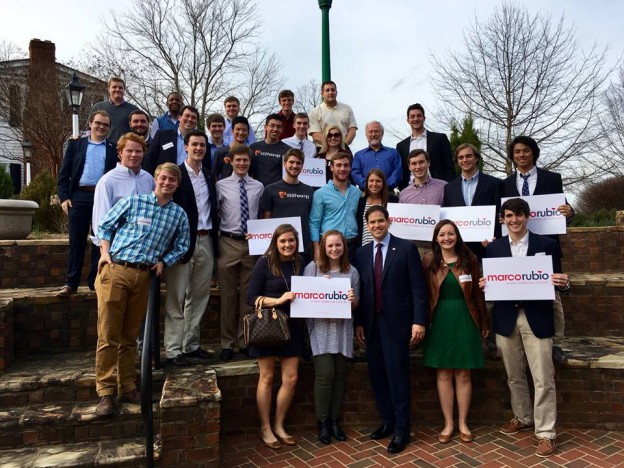
South Carolina recently finished its primary voting, with Hillary Clinton overpowering Bernie Sanders for the Democratic victory while GOP front-runner Donald Trump took all but two counties from the grasp of S.C. governor-endorsed Marco Rubio. But candidates were not the only ones breaking a sweat during the state’s campaign period.
A number of politically active Furman students have been involved in campaigns and political action committees (PACs) for many of the candidates who ran for the South Carolina nomination. Though former Fla. governor Jeb Bush dropped out of the race after an underwhelming performance in the Palmetto State, Jimmy Peacock, ’16, worked tirelessly over the past month as South Carolina director of the South Carolina Mission: Next Campus initiative for the Bush campaign. Peacock met former Florida governor in both more personal and more professional ways than many constituents would.
“He is constantly making phone calls, answering his own emails, giving speeches or even working the Dunkin’ Donuts drive-thru line,” Peacock said. “He simply never stops campaigning.”
Bush’s biggest moderate-conservative rival in the race, Florida senator Marco Rubio, nearly tripled his result in South Carolina and was a close contender with Ted Cruz for the second-place position in several earlier primaries before ending his campaign. Furman was able to hear Rubio on campus last semester thanks to the efforts of a number of students, including J.P. Burleigh, ’18. Burleigh joined the Rubio campaign as a volunteer last semester.
“I couldn’t believe he actually came,” he said about Rubio. “Even my democratic friends said they were very impressed by him.”
The other party does not see much less participation from Furman students. A group of Furman students and alumni serve as Hillary Fellows, an opportunity that allows college students and recent graduates nationwide to work directly for the campaign. Eva Estrada, ’16, says that her schedule has shifted because of her duties as a fellow.
“Despite a full course load, the campaign has become my top priority,” she admits.
Estrada says that many fellows do not hear about an event until the day before it happens, building a level of adaptability and resiliency in each campaign worker.
Owen Murphy, ’18, is a Bernie Sanders campaign volunteer en route to a paid internship, and says even though he “just stumbled into the position,” he is finding much more than a resumé booster from the experience.
“I think people assume canvassing and phonebanking are boring,” Murphy said, “but every single time I’ve done it I’ve walked away feeling invigorated to be a part of the political process.”
Some candidates, however, do not make it to the primaries. Sarah Desantis, ’17, worked for the CARLY for America PAC, which helped raise money and support for Carly Fiorina’s campaign. Though not quite able to learn hands-on the ways of primary politics, she did learn a few things that other campaign workers may not have.
“One thing people don’t realize about working with a super PAC is all of the rules that come with it,” Desantis said. “Being part of the super PAC meant that we could never have contact with the campaign and had to be careful that we were not overstepping our boundaries.”
While working for a presidential campaign has not been a relaxed period of time for these students, it has offered them a number of unique and fun opportunities. Anna Catherine Soldan, ’18, not only met Ted Cruz, whom she works for as South Carolina chair of Millennials for Cruz, but some of his celebrity endorsements as well.
“I recently met Phil Robertson, a.k.a. the Duck Commander, at a Cruz event,” she said. “I told him all about how my dad uses his duck calls and how we watch his show, and he responded with, ‘There’s hope for America.’”
Everyone has a memorable experience to share, it seems: Estrada canvassed at Super Bowl parties having never really watched the NFL, Peacock drove Jeb around South Carolina during his campaign in the state and Murphy was introduced to Ben Cohen, one of the founding members and namesakes of Ben and Jerry’s ice cream, just to name a few.
But this is much more than meeting big names and shaking hands. These students reached consensus that this has been a major opportunity to better understand the political landscape of America and its importance in our lives as citizens. While most of them believe other Furman students stay fairly active in terms of civic engagement, there are areas where some would like to see improvement.
“Everyone should take an introductory course in American government,” Desantis said, “because I learned so much from that class that has informed me about why our modern day political system is the way that it is and why polarization is happening right now.”
Murphy knows some friends who were not registered to vote in time.
“I understand that people are busy or have an interest in other things,” he said, “but presidential races occur once every four years, and voting is a privilege that millions of other people around the world do not have.”
For the few students who still have a campiagn to work with, Easter break may be busier than usual. But the payoff in terms of experience, connections and, in some cases, money seems to be worth it.
